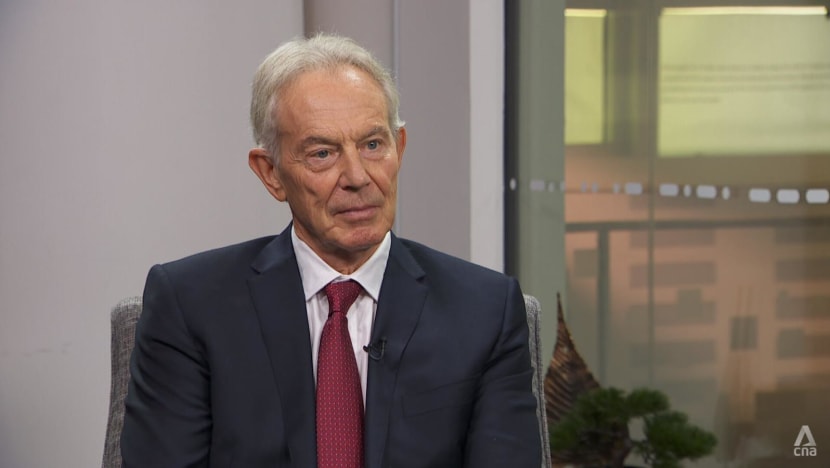Path to peace in Middle East still possible, says former British prime minister Tony Blair
Mr Blair, previously a Middle East peace envoy, spoke to CNA's Loke Wei Sue about the region, as well as relations between the United States and China.

Former British prime minister Tony Blair spoke to CNA's Loke Wei Sue on a range of topics, including the Middle East and relations between the United States and China.

This audio is generated by an AI tool.
SINGAPORE: Even as the risk of a wider Middle East conflict simmers following explosions in Lebanon, it is possible to bring an end to the almost year-long war in Gaza, said former British prime minister Tony Blair.
“It's extremely difficult, and there are real risks of escalation. However, I think that it is still possible … to bring to an end to the war in Gaza to set a path forward for the future,” he told CNA on Friday (Sep 20).
While attempts have been made to broker a truce between Israel and Palestinian militant group Hamas, proposal after proposal has been rejected by both sides.
Mr Blair was the Middle East envoy representing the United States, Russia, the United Nations and the European Union for eight years before he resigned in 2015.
He noted that there is broad agreement as to what needs to happen.
“Israel needs security, and the Palestinians need the hope of self-determination and ultimately, a Palestinian state,” he said.
“So even though we're in the midst of something that is immensely difficult with the real possibilities of escalation, I still think we've got to do everything we can to find a way back to that solution, because it is the only solution that works.”
Two days of deadly blasts from hand-held devices targeting Lebanese militant group Hezbollah have been attributed to Israel. Israeli officials have not commented on the blasts, but sources said Israel’s spy agency Mossad was responsible.
The coordinated detonations from Hezbollah’s pagers and walkie-talkies played out alongside the war in Gaza between Israel and Hamas.
FINDING A CONSTRUCTIVE AGREEMENT
Drawing on his experience in brokering a peace deal - the Good Friday Agreement - in the Northern Ireland in 1998, Mr Blair said while the decades-long Israeli-Palestinian issue is “a lot more complicated”, it is the same “in essence” as it similarly requires satisfying the most important needs of both sides.
The agreement in Northern Ireland - which is a part of the UK - was designed to bring an end to 30 years of violent conflict in a population divided across religious and political lines.
When the agreement was signed, it was thought to be a model to end conflicts between opposing communities in other parts of the world, including Palestine and Israel.
Mr Blair said that for people of two lands living side by side, the only alternative to peace is the stronger one always policing the weaker one.
“If you want peace, you've got to find the right constructive agreement that lets you get there. And even now, I can't see a way out of that that doesn't have those two elements - security for Israel, and self-determination for Palestinians,” he said.
He noted, however, that the politics in both Israel and Palestine have deteriorated over the last 20 years.
“You're never going to get peace unless the politics of both sides change,” he added.

IMPORTANCE OF US-CHINA TIES
During the wide-ranging interview, Mr Blair, who was in Singapore representing the Tony Blair Institute for Global Change at the Milken Institute’s Asia Summit, also spoke about the importance of the West keeping China engaged.
“I don't believe in trying to isolate China. There are many global questions, not least climate change and global health, in which we need China,” he said.
“In many ways, China can be a restraining influence on some of its allies.”Mr Blair said the relationship between China and the US is “the biggest question for geopolitics in the 21st century”, a view he has held for years.
“China and, in time, India are going to be major powers for the whole of this century and for the foreseeable future. How America relates, particularly to China, is going to determine the peace and stability of the world,” he said.
He noted that in the US and Europe - where he said the politics are in a febrile state - “there are quite strong forces of isolationism”.
However, he pointed out that even countries that do not want to get involved with the rest of the world end up doing so.
The US, in particular, needs allies in the face of a "strong division" between China and the West, Mr Blair noted.
“America is not going to get allies unless it engages with them and stays involved with them. That's why … I think the transatlantic alliance between America and Europe … will stay strong,” he said.
He added that the North Atlantic Treaty Organization (NATO) and the West will continue to build alliances within the world.
"We'll do that not out of some misplaced idealism, but we'll do that because realistically, that's the best way to make sure that we protect our values, our interests, our way of life," he said.






















